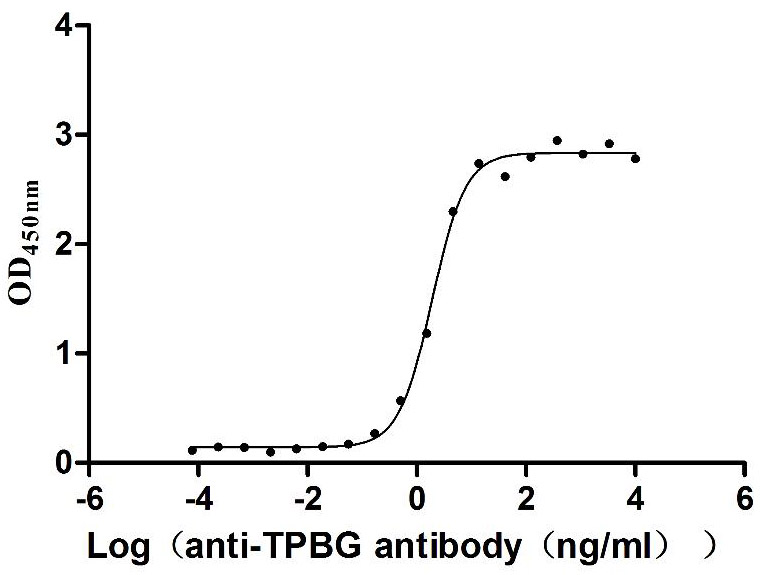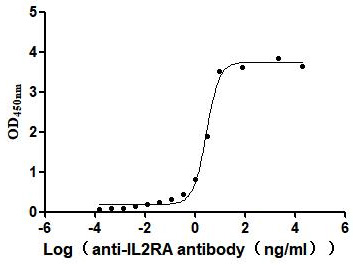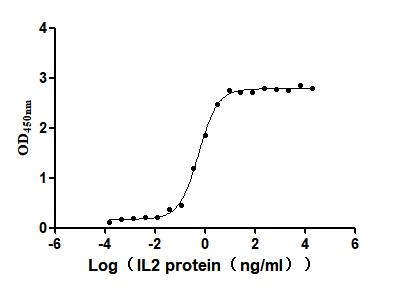Recombinant Chicken anemia virus Dual specificity protein phosphatase VP2 (VP2)
-
中文名稱:Recombinant Chicken anemia virus Dual specificity protein phosphatase VP2(VP2),Yeast
-
貨號(hào):CSB-YP302471CID
-
規(guī)格:
-
來(lái)源:Yeast
-
其他:
-
中文名稱:Recombinant Chicken anemia virus Dual specificity protein phosphatase VP2(VP2),Yeast
-
貨號(hào):CSB-EP302471CID
-
規(guī)格:
-
來(lái)源:E.coli
-
其他:
-
中文名稱:Recombinant Chicken anemia virus Dual specificity protein phosphatase VP2(VP2),Yeast
-
貨號(hào):CSB-EP302471CID-B
-
規(guī)格:
-
來(lái)源:E.coli
-
共軛:Avi-tag Biotinylated
E. coli biotin ligase (BirA) is highly specific in covalently attaching biotin to the 15 amino acid AviTag peptide. This recombinant protein was biotinylated in vivo by AviTag-BirA technology, which method is BriA catalyzes amide linkage between the biotin and the specific lysine of the AviTag.
-
其他:
-
中文名稱:Recombinant Chicken anemia virus Dual specificity protein phosphatase VP2(VP2),Yeast
-
貨號(hào):CSB-BP302471CID
-
規(guī)格:
-
來(lái)源:Baculovirus
-
其他:
-
中文名稱:Recombinant Chicken anemia virus Dual specificity protein phosphatase VP2(VP2),Yeast
-
貨號(hào):CSB-MP302471CID
-
規(guī)格:
-
來(lái)源:Mammalian cell
-
其他:
產(chǎn)品詳情
-
純度:>85% (SDS-PAGE)
-
基因名:VP2
-
Uniprot No.:
-
別名:VP2Dual specificity protein phosphatase VP2; EC 3.1.3.16; EC 3.1.3.48
-
種屬:Chicken anemia virus (isolate Germany Cuxhaven-1) (CAV)
-
蛋白長(zhǎng)度:full length protein
-
表達(dá)區(qū)域:1-216
-
氨基酸序列MHGNGGQPAA GGSESALSRE GQPGPSGAAQ GQVISNERSP RRYSTRTING VQATNKFTAV GNPSLQRDPD WYRWNYNHSI AVWLRECSRS HAKICNCGQF RKHWFQECAG LEDRSTQASL EEAILRPLRV QGKRAKRKLD YHYSQPTPNR KKVYKTVRWQ DELADREADF TPSEEDGGTT SSDFDEDINF DIGGDSGIVD ELLGRPFTTP APVRIV
-
蛋白標(biāo)簽:Tag?type?will?be?determined?during?the?manufacturing?process.
The tag type will be determined during production process. If you have specified tag type, please tell us and we will develop the specified tag preferentially. -
產(chǎn)品提供形式:Lyophilized powder
Note: We will preferentially ship the format that we have in stock, however, if you have any special requirement for the format, please remark your requirement when placing the order, we will prepare according to your demand. -
復(fù)溶:We recommend that this vial be briefly centrifuged prior to opening to bring the contents to the bottom. Please reconstitute protein in deionized sterile water to a concentration of 0.1-1.0 mg/mL.We recommend to add 5-50% of glycerol (final concentration) and aliquot for long-term storage at -20℃/-80℃. Our default final concentration of glycerol is 50%. Customers could use it as reference.
-
儲(chǔ)存條件:Store at -20°C/-80°C upon receipt, aliquoting is necessary for mutiple use. Avoid repeated freeze-thaw cycles.
-
保質(zhì)期:The shelf life is related to many factors, storage state, buffer ingredients, storage temperature and the stability of the protein itself.
Generally, the shelf life of liquid form is 6 months at -20°C/-80°C. The shelf life of lyophilized form is 12 months at -20°C/-80°C. -
貨期:Delivery time may differ from different purchasing way or location, please kindly consult your local distributors for specific delivery time.Note: All of our proteins are default shipped with normal blue ice packs, if you request to ship with dry ice, please communicate with us in advance and extra fees will be charged.
-
注意事項(xiàng):Repeated freezing and thawing is not recommended. Store working aliquots at 4°C for up to one week.
-
Datasheet :Please contact us to get it.
相關(guān)產(chǎn)品
靶點(diǎn)詳情
-
功能:May act as a scaffold protein in virion assembly. May also play a role in intracellular signaling during viral replication.
-
基因功能參考文獻(xiàn):
- The deletion of the C-terminal region of apoptin also impaired the replication of chicken anemia virus and attenuated its virulence in chickens. PMID: 28222746
- this study reports the use of apoptin and poly (I:C) combination as a novel strategy for cancer immunotherapy PMID: 27064544
- VP3-induced apoptosis, caspase-dependent intrinsic pathway plays an important role with the cleavage of poly (ADP-ribose) polymerase (PARP) PMID: 25809990
- Results show that The apoptosis induced by human adenovirus serotype 5 (AdHu5)-apoptin was independent of anti-apoptotic Bcl-2 and Bcl-xL proteins and the p53 pathway. PMID: 23812727
- In silico three-dimensional modeling of apoptin, molecular docking experiments between apoptin model and the known structure of Bcr-Abl, and the 3D structures of SH2 domains of CrkL and Bcr-Abl, were performed. PMID: 22253690
- These data demonstrate that Hsc70 is responsible for the down-regulation of Apoptin induced RelA/p65 gene expression. PMID: 21707973
- Apoptin induced the translocation of endogenous Hsc70 from the cytoplasm to the nucleus, and both were co-localized in the nucleus. PMID: 21565169
- Apoptin, expressed from the pseudotype baculovirus vector, has the potential to become a therapeutic agent for the treatment of solid tumors PMID: 19824041
- Apoptin, a protein from chicken anemia virus without an apparent cellular homologue, can induce apoptosis in mammalian cells. Its cytotoxicity is limited to transformed or tumor cells. PMID: 14765135
- Apoptin induces chromatin condensation when it is expressed in the nucleus and in the cytoplasm. PMID: 15965608
- role of c-Jun N-terminal kinase (JNK) in the apoptosis induced by apoptin gene in human lymphoma cell U937 PMID: 15989809
- Apoptin expression caused an increase in the tumor suppressor lipid ceramide, which regulates the cellular stress response PMID: 16887394
- apoptin kills tumor cells independently of PML and sumoylation, however, the interaction of apoptin with PML and small ubiquitin-like modifier (SUMO) proteins might be relevant for chicken anemia virus replication PMID: 16924230
- suggest that apoptin modulates ceramide/sphingolipid metabolism as part of its mechanism of action PMID: 16926120
- apoptin had an anti-neoplastic effect in vivo and in vitro in RSV-induced tumours PMID: 16963752
- T108 phosphorylation may only be required for the apoptotic activity mediated through the C-terminal apoptosis domain. PMID: 17223075
- PI3-K/Akt pathways have a dual role in both survival and cell death processes depending on the stimulus. PMID: 18021174
- Human peptidyl-prolyl isomerase-like 3 (Ppil3) is one of the Apoptin-associated proteins. PMID: 18474220
- C-terminus of apoptin (residues 74-121) is sufficient for tumor cell-enhanced nuclear targeting through phosphoinhibition of apoptin (74-121)-mediated nuclear export occurring exclusively in tumor cells. PMID: 18798550
- apoptin is necessary not only for DNA replication but also virus-like particle production of chicken anemia virus PMID: 19091368
- the pathway of apoptin-induced apoptosis and show that it essentially depends on abnormal phosphatidylinositol 3-kinase (PI3-kinase)/Akt activation, resulting in the activation of the cyclin-dependent kinase CDK2 PMID: 19103742
- Apoptin specifically kills tumor cells while leaving normal cells unharmed. The subcellular localization of apoptin appears to be crucial for this tumor-selective activity. Review. PMID: 19374922
顯示更多
收起更多
-
蛋白家族:Gyrovirus protein VP2 family
Most popular with customers
-
Recombinant Human Intestinal-type alkaline phosphatase (ALPI) (Active)
Express system: Mammalian cell
Species: Homo sapiens (Human)
-
Recombinant Macaca fascicularis Trophoblast glycoprotein (TPBG), partial (Active)
Express system: Mammalian cell
Species: Macaca fascicularis (Crab-eating macaque) (Cynomolgus monkey)
-
Recombinant Human Desmoglein-3 (DSG3), partial (Active)
Express system: Baculovirus
Species: Homo sapiens (Human)
-
Recombinant Human Tomoregulin-2 (TMEFF2), partial (Active)
Express system: Mammalian cell
Species: Homo sapiens (Human)
-
Recombinant Human Alkaline phosphatase, germ cell type (ALPG) (Active)
Express system: Mammalian cell
Species: Homo sapiens (Human)
-
Recombinant Human Interleukin-2 receptor subunit alpha (IL2RA), partial (Active)
Express system: Mammalian cell
Species: Homo sapiens (Human)
-
Recombinant Human CUB domain-containing protein 1 (CDCP1), partial (Active)
Express system: Mammalian cell
Species: Homo sapiens (Human)
-
Recombinant Human Interleukin-2 (IL2) (Active)
Express system: Mammalian cell
Species: Homo sapiens (Human)


















